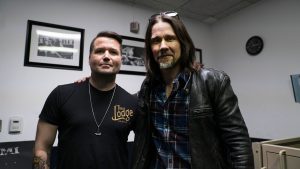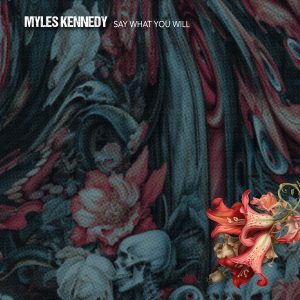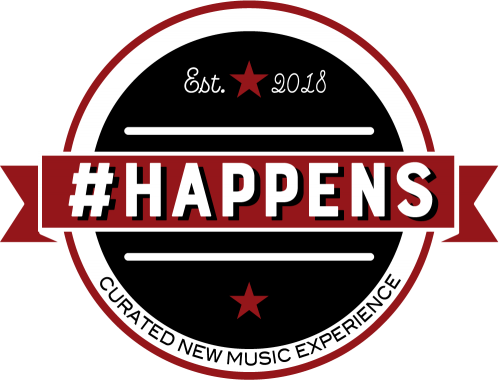Myles Kennedy is thoughtful, earnest, and boundlessly talented.
Slash loved his voice and personality so much that he renamed his solo band Slash Featuring Myles Kennedy and The Conspirators. He’s made seven albums as frontman for Alter Bridge, auditioned for the band that became Velvet Revolver, sang for Guns N’ Roses at their Rock Hall Of Fame induction ceremony, and nearly replaced Robert Plant in a reconstituted Led Zeppelin.
I first met the Spokane, Washington native as he prepared to release his debut solo album, 2018’s Year of the Tiger. I was mesmerized by his performance at the Musicians Institute in Hollywood, where he played acoustically alongside his friend and manager, Tim Tournier. His voice and presence resemble the late, great Jeff Buckley, and I felt an instant bond with him in conversation.
His second solo album, The Ides of March, came in 2021. Now he’s gearing up to release his third, the decidedly barn-burning The Art of Letting Go.
We caught up by phone on the eve of the release of his new single, “Say What You Will.”
The Art of Letting Go is due October 11, 2024, via Napalm Records.
This Q&A was slightly edited for length and clarity.

RYAN J. DOWNEY: You work with so many great collaborators, and you can execute your vision as a solo artist. Does it feel like the best of all possible worlds? Or is it overwhelming? What’s the general state of how you compartmentalize all your endeavors?
MYLES KENNEDY: It’s funny when you break it down like that. One could fall prey to being overwhelmed. But as I get older, I’ve tried to adopt the philosophy that ‘Gratitude is the attitude.’ So, I’m grateful for it. For me, the creative element is [even bigger] than performing. That’s the addiction. The solo endeavor has become an exercise in a lot of ways to learn to trust my own judgment.
When collaborating with people, you benefit from that immediate [feedback]. Whereas when you’re all by yourself, you are kind of left to your own devices, and you must cultivate that instinct of like, ‘Yeah, this is good, or, ‘it’s not good,’ because you can end up wasting a lot of time trying to realize an idea that ends up not being up to par at the end.
You’ve worked with producer Michael “Elvis” Baskette on almost a dozen albums.
MYLES: If it ain’t broke, don’t fix it. Elvis has been such an integral part of my career for the last 20-plus years. I love getting back in the saddle with him at the helm, knowing he’s behind the glass when we’re recording. I trust his instincts. If I perform something, and he’s like, ‘Yeah, I don’t know. I’m not feeling that.’ I don’t question it. Because I know we will be on the same page in the end. So, it’s been great to make yet another one with Elvis.
Some bands change producers often. For others, a producer is like a band member.
For some artists, it’s good to change it up often, as it will give each record a different flavor. But for me, it’s about that trust. I don’t want to put a bunch of time into writing a batch of tunes and then get into a situation where halfway through preproduction, you realize you made the wrong decision [producer-wise]. And then you’re worried about how your little sonic babies will turn out. I never have to worry about that with Elvis.
Do you sit down with the intention of writing solo stuff? How do you figure out whether it will work for a solo record vs. something you want to show [Alter Bridge guitarist Mark] Tremonti?
From a genre standpoint, Ides of March and especially Year of the Tiger, were very acoustic singer/songwriter [driven]. So, it used to be easy. But with this record, it was much more challenging, [because] the intention was to make a rock record. At times, I’d come up with an idea that straddled the fence of where it could go, and that made it hard. But what ended up happening is that now I’m ahead of the curve. When there’s another album with my other projects, I’ve got these ideas that I knew would work better elsewhere. I have a bit of a head start.
It seems like a good moment to indulge that side as a solo artist, given how busy the other guys in your projects are right now with projects of their own.
Yeah, it’s great. It feels like there’s a clear lane.
When I wrote the record last year, there was a very precise window of time I had to do it. My manager, Tim [Tournier], always has things planned. I mean, my life is planned out for the next five years, really. So, when a manager is kind of cracking the whip in that respect, you don’t want to disappoint them. I just had to hunker down and get this record written.
And what’s interesting about that, other than the fact that I had like six months to write it, it was also kind of a unique situation in that, for the first time in my career, I have this signature guitar that I worked on with Paul Reed Smith. What was interesting about having that guitar, as I was writing this whole record, is that it kind of informed; there was something about that instrument that just really inspired me creatively. In many ways, that guitar is why this record is so riff-based; it’s just a riff machine.
It’s sort of like a traditional old bluesman or something. ‘The magic is in the fiddle.’
Exactly. Like, ‘the devil gave me this.’ Though I promise you, Paul Reed Smith is not the devil. He’s a great guy.
You and I spoke a few years ago for my podcast, No-Prize from God, which wrestles with life’s big questions. The album title, The Art of Letting Go, is certainly evocative and seems to live in that wheelhouse of the spiritual and emotional. I realize it’s also the title track, but album titles are often meant to summarize a whole record.
What’s the significance of this title?
It’s a good question. Because as opposed to the first two solo records, which very much followed a theme throughout and kind of told the story, and this record; this record is a collection of songs. I was in different places at different points. I wanted to be free to express how I felt that day without having to stay on a specific trajectory.
The album title, The Art of Letting Go, sums up where I am with life right now. I’ve been working at becoming less reactive and learning the art of letting go through a lot of Eastern philosophy I’ve absorbed in the last six years, which has profoundly affected how I view the world and life. It’s been just an incredible benefit to me as a human being and creatively. It’s very liberating.
The title, The Art of Letting Go, sums up where I’m at, how it affected this record, and the freedom it allowed me. I started to go down this road around the time of Year of the Tiger. Once that album had been written and recorded, I suddenly had a bit of anxiety about releasing it.
There’s a different kind of vulnerability with the solo stuff. And it’s just your name on the tin.
On the tin. Exactly. And with that came this dire need to figure out how to navigate these waters because it was really affecting me. Fortunately, I started reading, and listening to lectures, and I found this thing that improved my life. I’m so grateful for that period because it’s been life-changing.

How did you choose “Say What You Will” as the album’s first single?
I wrote the intro riff in a hotel while on tour with Alter Bridge. And when I stumbled onto it, I was like, well, that’s it. I’ve been doing this for so long – sometimes ideas will drop in your lap. ‘There we go, that’s what we’ve been looking for.’ I knew the riff would be important. That song wasn’t easy to write because I wanted everything to be at the same level as that main riff, but it was fun. In the end, I knew that was the song. I just knew.
Lyrically, “Say What You Will” is full of piss and vinegar, in a way. I mean, it’s an intense lyric. It was written from a perspective of truth. It’s an empowering proclamation, you know, just to cut through the din of criticism, be it external or your internal voices that you struggle with.
The intro riff was very inspired by Mark Knopfler, believe it or not. I’ve been going through this massive phase of listening to his solo stuff and Dire Straits. But then, the rest of the song, when the band kicks in, it’s as if Jimmy Page and Prince got together with the Smashing Pumpkins. That’s kind of what I feel when I play that riff.
Says the guy who’s been in the room with Jimmy Page!
Well, yeah, I forgot about that.
Now, with three albums worth of solo material and all the songs fans will expect to hear from your other bands, how do you put together a Myles Kennedy setlist?
That’s going to be a tough question to answer. I mean, this is an awesome problem to have. I remember starting in bands years ago, with one record to tour on. After doing it for a while, you have a catalog. I don’t want to disappoint people coming to the show who hope to hear their favorite song. But there are also the songs that are important to me. So, it’s a delicate dance.
As far as songs from other bands, be it Alter Bridge or Slash and the Conspirators, I always want to be careful there. I know fans want to hear a few of those, but out of respect for my bandmates, I don’t want to be up there playing them without them – especially doing them exactly how we do them together. If I do those, I should alter the arrangements somewhat just out of fairness to them. I’m hyper-aware of that. That will be one of the things I’ll have to address once I start working on arrangements and whatnot.
But I am excited because this record is such a rock record.
Were there things that surprised you about these new songs?
Hmm, anything that surprised me?
Was there anything, musically or lyrically, that made you go, ‘Whoa! That came out of me?’
Yeah, you know, I guess what surprised me to some degree is that I allowed myself a finite amount of time, and most of the songs were written in that six-month window, but a handful percolated for a while. I’m certainly grateful that I was able to get that done. Because usually, I like a little more time. I want a good year to put into a record, if possible, but with all these projects, it’s almost impossible because the clock is ticking, and you must get it done.
What I think pleasantly surprised me is that after making this many records, there are still ideas at this stage. I’m always worried that I will dip into the well, and it will be bone dry. That’s a fear of every songwriter. I’ve been reminded through this process that I still, more than anything, just love creating.
There’s nothing else for me like the high I get when I know a song resonates with me. ‘Okay, I’m tapping into some truth here,’ or if it’s goosebumps because I’m emoting something from an honest place. And as long as I continue to have that portal that I can extend into, I will probably keep doing this because there’s nothing like it. It’s so, so liberating. I can’t imagine life without it.
Everybody’s got the thing that gets them off, that makes them feel alive. I can’t imagine not having that. And for me, it’s songwriting.
So, I’ll say it once again: gratitude is great.

